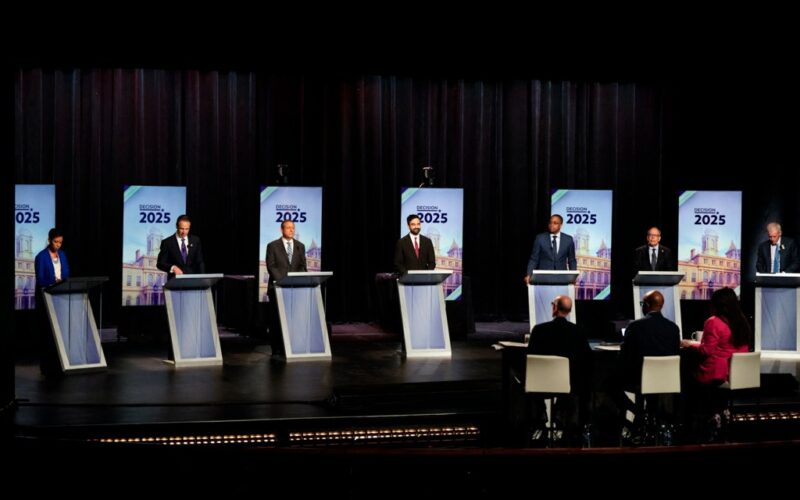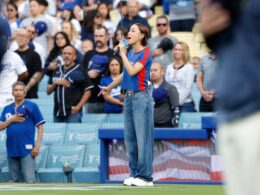A closing thought on New York City’s brutal mayoral primary before the last votes are cast on Tuesday: The stakes are lower than they seem.
Over the last 12 years, Bill de Blasio and then Eric Adams cruised into City Hall after winning the primary as Democratic leaders reclaimed near-total control of the city after waiting out two decades of break-glass-in-case-of-emergency outsider mayors in Rudy Giuliani and Mike Bloomberg.
Because Democrats have a vast voter registration advantage here, the party’s primary, only open to its members, is often the low-turnout contest that really counts. This year is different.
An aging, left-punching former governor with a checkered record who was eventually pushed out of office by his own party is up against a centrist-suspicious young socialist lawmaker who hasn’t passed many laws but is promising the moon for the mayoral nomination of a party that basically no one, including its own candidates, likes or respects.
Both frontrunners are urging voters not to rank the other.
Mamdani has been aided by months of messaging about not ranking Cuomo from the Working Families Party and its constellation of left-leaning groups that rely on government spending while pushing that same government to move further left and spend more.
The clench-toothed Cuomo, for his part, is counting on a deluge of late money from the very rich to convince New Yorkers to reject this alleged barbarian at the gate, months after a smiling Mamdani surged to the top of the polls and inspired and organized a small city worth of door-knockers to spread the word on his behalf as he campaigned and introduced himself in seemingly every corner of the city.
One group supporting Cuomo has taken in $24 million with Mike Bloomberg along giving $8.3 million — which is equal to what a single candidate can spend under the city’s campaign finance system, though nothing compared to the quarter-billion the former mayor put into his own campaigns.
Back to Cuomo and Mamdani’s “don’t rank the other guy” appeals, they’re both right.
Cuomo is exhausting and maybe also exhausted. It’s hard to tell from his heavily guarded and scripted campaign if he really wants this job or even to be in the city.
Mamdani, like his posters, is ubiquitous, composed, coherent and paper-thin, the avatar of a rigidly ideological DSA with no record of producing the material gains he keeps promising while posing a question Donald Trump did about his party rivals a decade ago: How much worse could I be?
Whoever wins the primary, both candidates will likely be on the ballot again in November with Mamdani presumably picking up the WFP line or Cuomo continuing to run on his own Fight and Deliver line.
Cuomo would be competing in the center with Adams, the compromised and increasingly Trump-aligned ex-cop who won the Democratic nomination the last time around but is now running as an independent, and Jim Walden, an accomplished attorney offering himself as the get-stuff-done alternative who isn’t crooked.
Those three would likely have Mamdani running to their left and Guardian Angel founder and media personality Curtis Sliwa on the right as the Republican nominee.
Or this could all play out differently — we’ll know soon. However it does, a crowded field in a most-votes-wins contest could lead to an almost accidental result. It’s as serious and ridiculous as a Russian roulette game inside a clown car.
Still, it’s good to see a real general election, where all the city’s voters have a real say in its future, emerging for the first time since Mamdani hit the legal drinking age.
There’s a line twice as old as Mamdani that’s been recycled about him this year: “he is fresh and everyone else is tired.”
Not all of the Democrats who missed their shot this year looked tired but many have and it keeps getting harder to break through with ideas or credentials in an overcrowded market for attention, as past candidates overshadowed for key stretches by primary frontrunners Anthony Weiner or Andrew Yang can vouch.
John Lindsay, the great reform hope of his day, was elected mayor as a Republican (and Liberal) in a three-way race in 1965 while using columnist Murray Kempton’s “he is fresh” line as his unofficial slogan.
Another Kempton line that year about a handsome young lawmaker who promised to make New York a “fun city” before the phrase became an ironic shorthand for its decline on his watch:
“He is such a nice guy that you can almost forgive him his shallowness.”
Siegel (harrysiegel@gmail.com) is an editor at The City, a host of the FAQ NYC podcast and a columnist for the Daily News.








